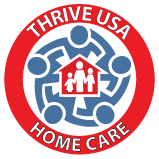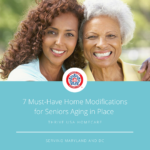Archive for the ‘In-Home Care’ Category
A Day in the Life of a Thrive USA Caregiver
Caring for older family members who are sick or aging is demanding. You can decide what support and assistance your loved ones need by learning more about what a typical caregiver’s day entails. When you start caring for a sick older relative, you will quickly realize that there is no such thing as a routine weekday. Caregivers may care for numerous clients in a week or only one client they care for around the clock. Some people may have to assist their patients in traveling to a hospital for treatment, running errands, or helping with household chores and providing companionship …
Care Following a Hospital Discharge
A journey to the hospital might last several days for an older adult, and medical procedures can bring a slew of additional caregiving tasks that persist long after the patient returns home. Older adults frequently require higher levels of care during a hospital stay, which translates into higher care needs after discharge. It is key that family caregivers completely understand what is required as soon as possible, as this will better equip them to coordinate the care required to keep their loved ones safe and recuperate. Preparation is Key Caring for a loved one following a hospital discharge can be…
The Benefits of In-Home Care Services
While some seniors are content to move to a nursing home or care facility when they can no longer care for themselves, others want to stay in the comfort and familiarity of their own home. In-home care services allow seniors to preserve their freedom while receiving daily support from qualified caregivers. In-home care has quickly become one of the most popular solutions for older persons seeking expert care without leaving their homes. Here are a few advantages of in-home care services to consider before making your decision. One-on-One Attention One of the most significant advantages of choosing in-home care services…
When is it Time For Hospice Care?
Accepting aging can be a difficult process. Many older adults associate illness with loss of independence or becoming a burden on loved ones. This could explain why they don’t always tell you how they truly feel. It may be up to you to recognize the signs of deteriorating health and the need for specialized care. Understanding potential signs that the end is near reduces anxiety and allows you to honor the wishes of your aging loved ones. Many families put off calling hospice until their loved one is in their final days or weeks of life. However, if the patient…
Home-Modification Bill Could Help Adults Age in Place
A bill introduced in Congress in May would assist seniors in paying for home modifications that would make their houses more accessible and livable as they age. The Home Modification for Accessibility Act, sponsored by Reps. Charlie Crist and Thomas Suozzi is now in the House Ways and Means Committee. If approved, it would allow seniors who want to make aging-in-place upgrades in their homes to deduct the expenses of such upgrades from their income taxes or pay for the improvements out of their retirement funds without penalty. Rep. Crist said in a statement that many homes don’t have these…
6 Tips for Medication Management for Older Adults
You may have heard about the importance of medication management if you take care of an aging loved one or if you are getting older yourself.
9 Benefits Of Hiring A Caregiver For In-Home Help
Do you find yourself wondering if hiring a caregiver for in-home care is the best decision for your loved ones? You may have observed your parents’ age catching up with them as they get older. Perhaps your mom used to clean the house consistently but now finds it difficult to keep up with everyday tasks and chores. Perhaps your father has a habit of forgetting to turn off lights, turn off the oven, or even pay bills. Although these indicators are worrisome, they may not necessarily mean that your parents should be moved into an assisted living facility. Instead,…
5 Cognition-Enhancing Activities for Stroke Recovery
Strokes can affect sensory, motor, and cognitive impairment in older adults. These problems, if left untreated, may impair one’s ability to think, communicate, move, and perform other daily tasks.
7 Must-Have Home Modifications for Seniors Aging in Place
Some of the modifications that assist seniors in avoiding falls and other situations that jeopardize their safety are low-cost or easy do-it-yourself tasks. Changing some features of your house to make some everyday activities easier will help seniors keep their independence for a longer period of time. Here are a few of the most typical house modifications for those who want to age in place.
Facts About ALS Support & In-Home Care
ALS (Amyotrophic Lateral Sclerosis), often known as “Lou Gehrig’s Disease,” is a neuromuscular disease that starts with muscle weakening and progresses to full paralysis throughout the body. Lou Gehrig’s disease is another name for ALS, which is not to be confused with Motor Neuron Disease (MND). The muscles that control eating, swallowing, and speaking degenerate as a result of this condition. It gradually weakens the muscles that control your arms and legs, as well as the muscles that keep your body upright. Finally, it impairs the muscles that allow you to breathe on your own to the point where mechanical…












